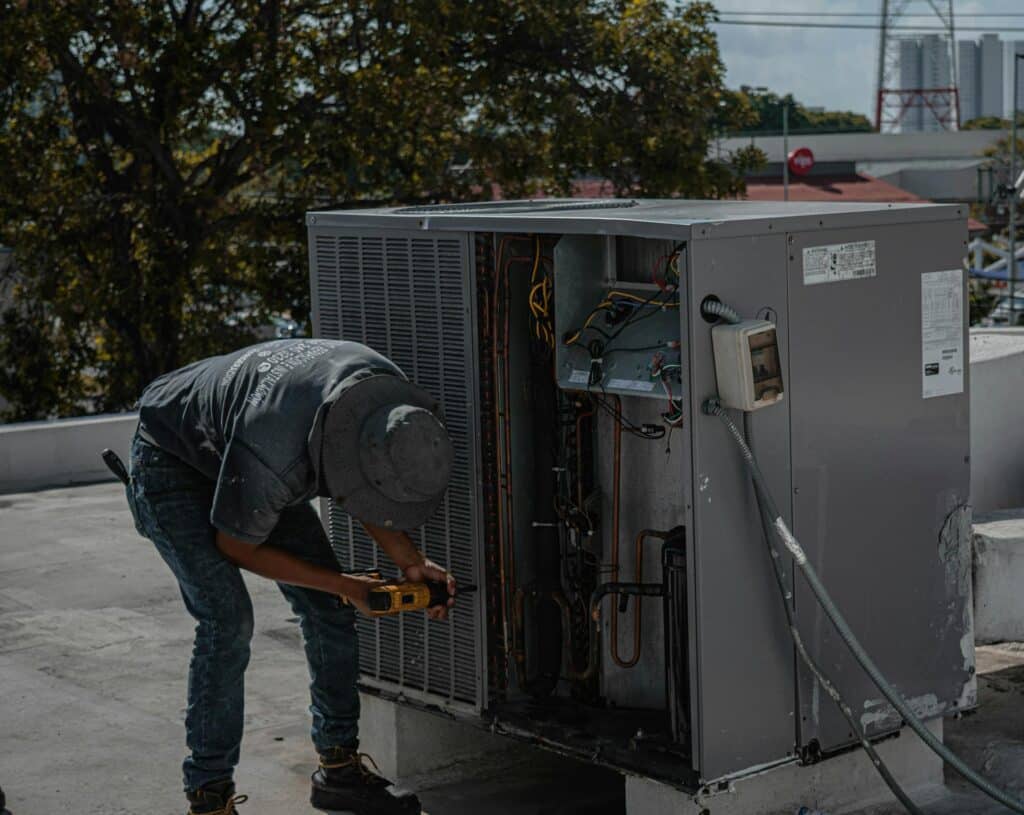What is Included in a Home Warranty?

If you’re asking ‘What is included in a home warranty?’, you’re seeking clear, straightforward information. A home warranty typically encompasses the repair or replacement costs of many home systems and appliances like HVAC, electrical, plumbing, refrigerators, and more – all prone to wear and tear. Our guide will walk you through the essentials of what these warranties cover, how service contracts work, and the kind of protection you can expect for your home investments.
Comprehensive Breakdown: What is Included in a Home Warranty?
Home warranties provide protection against system and appliance failures due to normal wear and tear, differing from homeowners insurance which covers structural damage from external events.
Costs associated with home warranties include annual fees, service call charges, and potential limitations on payouts, which necessitate a balance between the offered protection and the financial commitment.
Maintenance is essential for effective home warranty coverage; regular upkeep is a requirement to avoid denied claims, and homeowners must carefully understand what is not covered by their policy.
Exploring Home Warranty Coverage

Navigating the world of home warranties can be as complex as the systems they protect. At its core, home warranty coverage serves as a shield against the normal wear and tear that inevitably wears down our home’s vital systems and appliances. Whether it’s the air conditioning unit that cools your summer days or the refrigerator that preserves your meals, a home warranty plan steps in to ensure these essentials are taken care of, so you can focus on enjoying your home, not fretting over potential failures.
Core Systems Under Home Warranty Protection
The heart of any home warranty plan beats within its coverage of core systems. From the HVAC system that keeps you comfortable to the electrical network powering your daily life, and even the home warranty cover plumbing that underpins your home’s functionality, these are the systems that make modern living possible.
Unlike homeowners insurance, which acts in the wake of disaster, home warranties provide proactive protection against the malfunctions of everyday life, maintaining the pulse of your household’s rhythm.
Appliance Assurance with Home Warranties

Beyond the fundamental systems, home warranties extend their embrace to the appliances you rely on daily. From the kitchen to the laundry room, the coverage includes those workhorses that keep your household running smoothly, such as:
- refrigerators
- ovens
- dishwashers
- washing machines
Even those extra conveniences, like trash compactors and ceiling fans, can be safeguarded under the most comprehensive plans.
This appliance assurance is what allows you to indulge in the comfort of routine, trusting that any disruption will be swiftly managed.
Additional Coverage Options

But what about the extras that make your home uniquely yours? Additional coverage options are available to tailor your home warranty to your lifestyle. Fancy a dip in the pool or a soak in the hot tub? There’s coverage for that. Concerned about the integrity of your roof during a downpour? Add-on options for roof leak repairs are available, though they may not cover all scenarios. And for the peace of mind that your garage door will always open to welcome you home, there’s optional coverage for that too.
Understanding Service Contracts and Fees
A home warranty is more than a promise; it’s a service contract that comes with a financial commitment. The cost intertwines with the depth of coverage, the additional services you opt for, and the reality that when a repair is needed, a service call fee will come into play. It’s a balancing act between protection and price, where homeowners weigh the potential savings against the upfront investment of annual fees and per-incident charges.
The Annual Commitment
The annual fee—a homeowner’s first financial consideration—varies widely. Depending on whether you seek to cover appliances, systems, or a combination of both, and how comprehensive you desire your coverage to be, the annual cost can range from a few hundred to over a thousand dollars. This fee reflects not only the scope of coverage but also factors like the age of your systems and appliances and the cost of services in your area.
It’s a yearly commitment that sets the stage for the protection your home will receive.
Navigating Service Call Charges
When a covered item breaks down, the service call charge, also known as the service fee, becomes the immediate cost of action. Typically ranging from $75 to $125, this fee is your ticket to a service visit from a qualified technician. Payable at the time of the visit, it’s a small price for the convenience and expertise provided.
However, be mindful that your choice of service provider may be limited by your warranty company’s network, so it’s worth considering the flexibility and terms of potential providers.
Coverage Caps and Limitations
With every home warranty plan, there’s a ceiling to the coverage—a cap on what the company will pay out for repairs or replacements. These limits are set per item and as an annual aggregate, ensuring that the warranty company can sustain its service across its customer base. It’s a balancing act where homeowners must be prepared to cover any costs that exceed these limits, such as in the case of high-end systems like a steam-circulating heating system.
The Exclusions and Limitations of Home Warranties
Understanding what a home warranty does not cover is as important as knowing what it does. While these service contracts can act like a knight in shining armor for your home’s systems and appliances, they have their limitations and exclusions. Roof leaks, outdoor plumbing, and cosmetic defects are just a few items typically outside the warranty’s realm.
It’s essential to read the fine print before signing on the dotted line to ensure you’re not left uncovered when you need it most.
Pre-Existing Conditions and Wear
When it comes to pre-existing conditions and wear, a home warranty company may require an inspection or mechanical tests to determine if the issue was present before coverage began. This is why there’s often a waiting period after purchasing a warranty before you can file a claim. It’s designed to ensure that the warranty covers breakdowns due to normal wear and tear, not problems that were already brewing when the contract was signed.
Maintenance Matters
Warranty or no warranty, maintenance is non-negotiable. Regular upkeep, like servicing your air conditioning before the summer heatwave hits, is not only smart homeownership—it’s often a requirement for keeping your home warranty in good standing. Neglecting maintenance can lead to denied coverage, especially for crucial systems like HVAC, where proper care is critical.
So, roll up those sleeves or call in the pros; your home and your warranty depend on it.
The Value Proposition of Home Warranties
Home warranties offer tangible benefits, including:
- Financial protection against repair costs
- Convenience of having a go-to resource for qualified repair technicians
- Service quality
- Coverage scope
- Peace of mind
When considering a home warranty, it’s important to weigh the cost against the value and consider the price, service quality, coverage scope, and peace of mind it can bring to your home life.
Financial Protection Against Repair Costs

The cornerstone of a home warranty’s value lies in its financial protection. Unplanned repair costs can strain any budget, but a home warranty acts as a buffer, particularly for owners of older homes where the likelihood of system failures is higher. Some warranties even cover preexisting conditions, providing a predictable cost landscape for homeowners and alleviating the financial burden of unexpected repairs.
Convenience and Peace of Mind
But the allure of home warranties isn’t purely financial. There’s immeasurable value in the convenience of having a single point of contact when something breaks down and the peace of mind that comes from knowing you have access to a network of pre-screened service providers. It simplifies the repair process, saving you the time and hassle of finding and vetting a technician on your own.
Comparing Home Warranties and Homeowners Insurance
While both home warranties and homeowners insurance provide important protections for your home, they serve different purposes and cover different risks. Understanding the distinctions between the two can help you navigate the safety nets available for your home and make informed decisions about the coverage you need.
Distinct Coverage Areas
Home warranties complement homeowners insurance by focusing on the internal workings of your home—the systems and appliances that require repair or replacement due to normal wear and tear. In contrast, homeowners insurance steps in when structural damage occurs, covering your home and personal belongings against a wide range of external perils, including:
- natural disasters
- theft
- fire
- vandalism
- water damage
Together, they offer a comprehensive safety net, ensuring all aspects of your home are protected.
Making the Right Choice for Your Home
In making the right choice for your home, consider the age and condition of your home’s systems and appliances, and weigh these against the likelihood and potential costs of repairs. While homeowners insurance is generally required by mortgage lenders, a home warranty is a discretionary purchase that can provide additional coverage for the items that keep your home operational.
It’s about balancing the mandatory protection of your home’s structure with the optional safeguarding of its contents and functionality.
How to File a Home Warranty Claim

When a covered item fails, knowing how to file a home warranty claim can expedite the repair process and minimize inconvenience. The claim process involves:
- Prompt reporting
- Clear communication
- Coordination with service providers
- Keeping detailed records of interactions for a well-documented claim.
Initiating the Claim Process
To initiate a claim, follow these steps:
- Report the problem to your home warranty provider as soon as you detect it.
- Use the various channels available for contact, from web portals to mobile apps, to provide detailed information about the issue and your contact details.
- Remember, a swift and detailed claim can mean the difference between a quick fix and a prolonged disruption.
Service Provider Coordination
Once your claim is approved, the home warranty provider will facilitate the repair by coordinating with an approved service provider. The process involves:
- Setting an appointment with a technician
- The technician will determine the issue’s coverage eligibility
- The technician will undertake the necessary repairs.
After the service visit, inspect the work and expect follow-up from your manufacturer’s warranty provider to ensure service quality and satisfaction.
Selecting the Best Home Warranty Provider
Choosing the best home warranty provider for your needs involves more than just comparing prices. It’s about assessing the provider’s:
- Reputation
- Reliability
- Customer service quality
- Flexibility of their plans and coverage options.
Reputation and Reliability
A provider’s reputation for reliability can be gauged through their Better Business Bureau rating and customer reviews on platforms like Google Reviews and TrustPilot. It’s also wise to check their state licensing to confirm that they meet regulatory standards. Look for indicators of quality customer support, such as 24/7 availability and a track record of prompt responses to inquiries and claims.
Customizable Plans and Coverage
Home warranties should fit like a glove, offering the right protection for your specific needs. Most home warranty companies, such as home warranty providers, offer various plans, from basic to comprehensive, and allow for additional coverage of items not typically included, like pools and additional refrigerators. It’s essential to understand what home warranties cover, including whether a home warranty cover windows, to ensure you select the best plan for your needs. Moreover, it’s crucial to know when home warranty coverage begin and that home warranties pay claims when the covered items require repairs or replacements.
This flexibility ensures that you can build a plan that mirrors your lifestyle and protects the parts of your home that matter most to you.
Seasonal Considerations for Home Warranty Coverage
As the seasons change, so do the needs of your home. Each season carries its own set of challenges and potential hazards, from harsh winter frosts to the scorching heat of summer, each testing the resilience of your home’s systems and appliances.
A home warranty can be your seasonal ally, adapting to provide the right coverage when you need it most, ensuring that your home remains a place of comfort and reliability throughout the year.
Weathering the Seasons
The relentless cycle of seasons can take a toll on a home. Freezing temperatures and frequent rains can exacerbate existing issues or reveal new ones, especially in critical systems like heating and plumbing. Being proactive with seasonal maintenance, such as winterizing your home, can help prevent breakdowns and ensure your home warranty coverage is effective when you rely on it most.
Tailoring Coverage to Seasonal Needs
To truly harness the benefits of your home warranty, consider tailoring it to your home’s seasonal needs. This might mean adding coverage for your HVAC system as summer approaches or ensuring your roof is covered before the rainy season. These strategic choices can help mitigate the risks associated with increased usage of systems during seasonal transitions and keep your home running efficiently.
Remember, regular inspections and weatherproofing are also key to seasonal preparedness, and your home warranty can back you up on covered repairs identified during this process.
Summary
In conclusion, a home warranty can be a valuable asset for any homeowner, offering a layer of financial protection and peace of mind. By understanding what is covered, how the service contracts work, and the limitations involved, you can make an informed decision that safeguards the comfort and functionality of your home. Remember to consider seasonal needs and tailor your plan accordingly, ensuring your home remains a sanctuary no matter what the weather brings. Let your home warranty be the safety net that catches you, allowing you to enjoy your home with fewer worries and more confidence.
Frequently Asked Questions
What is typically included in a home warranty?
A home warranty typically includes coverage for major home appliances like refrigerators, washers, dryers, ovens, microwaves, and HVAC systems, as well as plumbing, electrical systems, and optional amenities like pools and spas. It may also cover systems such as heating, cooling, and plumbing, along with appliances like refrigerators, ovens, and dishwashers.
What does a home warranty cover vs insurance?
A home warranty covers expected breakdowns of appliances and systems due to aging, while insurance covers unexpected events leading to damage, such as natural disasters and theft. Insurance is for major perils like fires and theft, while warranties cover wear and tear on appliances and home systems.
Are showers covered in home warranty?
Yes, showers are typically covered under a home warranty, as they fall under plumbing systems and are included in the service line warranty for repairs or replacements. This coverage applies to indoor pipes, fixtures, and other plumbing components.
Do home warranties cover electrical?
Yes, home warranties typically cover electrical systems including broken light switches, electrical wiring, and faulty electrical outlets, but may exclude protection for multimedia and security system wiring.
Are there any service fees associated with a home warranty?
Yes, homeowners are responsible for a service call fee, generally ranging between $75–$125 per issue, paid directly to the technician during the service visit.